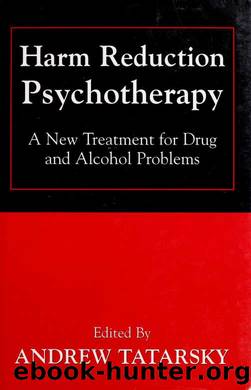Harm Reduction Psychotherapy: A New Treatment for Drug and Alcohol Problems by Andrew Tatarsky

Author:Andrew Tatarsky [Tatarsky, Andrew]
Language: eng
Format: epub
Tags: Drug abuse, Alcoholism, Harm reduction, Substance-Related Disorders, Psychotherapy
ISBN: 9780765703736
Amazon: 0765703734
Publisher: Jason Aronson
Published: 2007-06-09T22:00:00+00:00
counterdependency," suggesting that he felt great about himself and didn't need anything from anyone. He also tried to prop up his deficient sense of self by proving to himself and others that he was better than he felt he was by taking tremendous personal risks and making achievement and conquest more important than anything else. That this confident exterior was only a front was proven by the fact that the "rush" he got from winning was short-lived and never enough. His insatiable need for attention and reassurance was never satisfied.
Early on, he used alcohol and marijuana to "enhance" this social facade. These substances supported him in self-presentation to the world. This worked for him through college and graduate school. When he entered medical school he became relatively moderate in his drug and alcohol use, Khantzian says, "because he had changed locations, was too busy, and had few friends or contacts to persist in his previous pattern." This is a good example of how the personal vulnerabilities I have been talking about don't in and of themselves explain drug use. When Gary's social and professional life no longer supported excessive drug use and actually conflicted with it, his use became more moderate. However, his self-esteem and other personal vulnerabilities set him up to return to using during a crisis while completing his residency in anesthesiology.
Toward the end of his training he had an extra case load, was more on-call at the hospital, was physically inactive, and was feeling increasingly tired, sick, lonely, and unhappy. He was also feeling anxious about his upcoming exams and felt that he was not keeping up. He said that he "had no skills for reaching out or asking for help" and began using Fentanyl, a powerful painkiller like heroin, to numb the pain. Here we see all four of Khantzian's sectors of vulnerability conspiring to set him up to return to drug use in an effort to cope with intense suffering. The demanding circumstances facing Gary created a set of painful feelings with which he was not equipped to deal. His problems caring for himself no doubt contributed to Gary getting himself in this situation to begin with; for example, agreeing to take on more work than he could handle and being physically inactive. He also had no resources for effectively dealing with how badly he was feeling and, looking back after some time in treatment, he was
Download
This site does not store any files on its server. We only index and link to content provided by other sites. Please contact the content providers to delete copyright contents if any and email us, we'll remove relevant links or contents immediately.
Should I Stay or Should I Go? by Ramani Durvasula(7652)
Why We Sleep: Unlocking the Power of Sleep and Dreams by Matthew Walker(6706)
Fear by Osho(4727)
Flow by Mihaly Csikszentmihalyi(4689)
Rising Strong by Brene Brown(4450)
Why We Sleep by Matthew Walker(4434)
The Hacking of the American Mind by Robert H. Lustig(4375)
How to Change Your Mind by Michael Pollan(4355)
Too Much and Not the Mood by Durga Chew-Bose(4337)
Lost Connections by Johann Hari(4173)
He's Just Not That Into You by Greg Behrendt & Liz Tuccillo(3891)
Evolve Your Brain by Joe Dispenza(3671)
The Courage to Be Disliked by Ichiro Kishimi & Fumitake Koga(3489)
Crazy Is My Superpower by A.J. Mendez Brooks(3398)
In Cold Blood by Truman Capote(3375)
Resisting Happiness by Matthew Kelly(3337)
What If This Were Enough? by Heather Havrilesky(3308)
The Book of Human Emotions by Tiffany Watt Smith(3300)
Descartes' Error by Antonio Damasio(3270)
